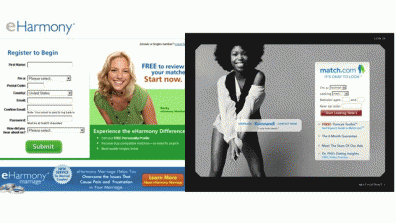
More and more people are looking for love online. (Reuters)
Love's labor is not lost -- at least, not online.
Dating for most people is now officially a digital endeavor, according to a study out just in time for Valentine's Day. Commissioned by the Association for Psychological Science (APS), the 64-page report analyzed 400 psychology studies and public interest surveys and concluded that most romantic connections today are made online, second only to meeting through friends.
That may not be so surprising given the vicissitudes of trying to meet people by hanging out in the local coffee shack with your laptop, decked out in your favorite hipster attire. And the work place is no place to find a date since it's fraught with potential political and ethical snags nowadays: Do I work for her? Does she work for me? Oh, forget it.
By many accounts -- including a personal survey of friends -- the online dating scene is a vibrant social milieu that no longer carries the stigma it once did. Back in the 90's many friends would chide with, "What's the matter? Couldn't you meet anyone in a bar?" That's when less than 1 percent of people met partners through online or offline personals.
By 2005, about 37 percent of single Americans had set up dates online. Today, about 40 million Americans visit online dating sites each month, roughly one in three relationships start online, and over 120,000 marriages a year were spawned on the Web (according to Online Dating Magazine).
Indeed, several friends admitted to me that they met their (current) wives online, a fact I didn't know until I started researching for this column. So maybe there's still something of a stigma attached to online attachments.
While people may be hooking up online more often, it isn't due to any scientific or magic algorithms.
While people may be hooking up online more often, it isn't due to any scientific or magic algorithms. The ASP study dismisses all such claims by dating sites, noting that there's no objective evidence that they can do a better job finding a match using special software. One friend confirmed this, noting that he found big sites like Match.com "like going to the mall." Maybe you'll find the right person in the crowd, but there are more misses than hits.
And while I've met people who seem happy with eHarmony, others who've tried it found it "icky." Many people recommend finding a smaller site that's tailored to your particular interests, such as Nerve.com, or one based on a local community group.
Digital dating can yield successful long-term romantic relationships, according to the study, because the sites offer access and communication. There are several other reasons for a growing comfort level with these sites, I believe. The first is that the rejection takes place in advance and anonymously. You don't have to know how many people have checked you out, and then dismissed you (much better than enduring insults at the bar).
The second attraction of digital dating is that it's flexible. Busy this week? Contact them next week. Not comfortable having a thousand men pore over your profile? Go to HerWay.com where all the female profiles are hidden. The women go through the men's profiles and then decide who to contact. It avoids the problem some women have experienced of being "carpet bombed" by contacts from men. HerWay.com claims that it is at least five times more likely that online daters will successfully connect when a woman initiates contact. No kidding.
The third reason this scene works is that it's work. Filling out all that personal information, favorite songs, the three famous people from history you'd invite to dinner, etc., takes time and effort. So it's a self-selecting, goal-oriented group. Of course, the differences between men and women aren't erased by going online.
According to the APS report, a study of 6,485 users of a major dating site found that men viewed three times more profiles than women did. That fact underscores one potential pitfall of online dating: It can turn into online shopping. The researchers warn that this can make people overly "judgmental" and picky. (So what if she likes Adele; go with it.) They also warn that too much digital dialogue can kill the buzz by generating unrealistic expectations before you meet: "He was so attentive online, but now he hardly calls."
Naturally, if you're not looking for a serious relationship and want to find someone right this minute, there's an app for that. At least two seem to be picking up, er, steam. Skout has 7 million members and works by introducing "like minded" singles to one another based on proximity. There's also SinglesAroundMe, a similar, international location-based mobile app. Others are Blendr and Grindr.
As for dating sites, no matter what you do, "You have to be honest," advises one woman who found her boyfriend of two years online. "You have to know what you want. And you have to know what you'll give up to get it," she told me. She and others also noted that you can ask some tough questions right up front, something you'd be unlikely to do face to face.
So now that online dating has gone mainstream, there's no excuse not to get out there. And you've still got a week to find a date for Valentine's Day.
Follow John R. Quain on Twitter @jqontech or find more tech coverage at J-Q.com.
